ICICI Foundation’s Initiatives on Environment
ICICI Foundation is dedicated to promoting environmental conservation and improving biodiversity across the country. The Foundation’s initiatives focus on plantation, ecological and bio-diversity conservation in forests, water conservation and providing solar power units. These efforts aim to maintain ecological balance and ensure sustainable development of communities that depend on the natural environment for their livelihood, particularly around protected areas.
Expanding Green Cover
The plantation initiatives of ICICI Foundation are an important aspect of its environmental conservation goals. Since fiscal 2022, ICICI Foundation has consistently expanded the green landscape by working on various projects like Miyawaki plantation, avenue plantation, grasslands in forests and other plantation projects. The Miyawaki method was pioneered by the late Japanese botanist Akira Miyawaki. It is a unique technique of plantation involving mixing of saplings from different species of trees that are native to an area. The resultant mixed dense plantation resembles a natural forest, which eventually becomes self-sustaining. ICICI Foundation planted 3.7 million trees till March 31, 2024 across the length and breadth of the country.
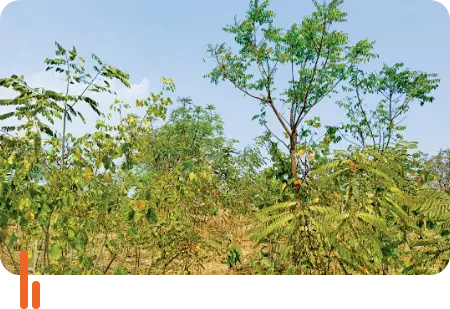
Miyawaki plantation at Kanadi Budruk village in Beed district, Maharashtra
1.1 million
Trees planted in fiscal 2024
3.7 million
Trees planted since fiscal 2022
(At March 31, 2024)
ICICI Foundation Joins Initiative to Plant 250,000 Trees
In fiscal 2024, ICICI Foundation and Tata Power collaborated to plant 250,000 trees across 75 acres in the Western Ghats in Maharashtra over the next five years. Project ‘GhanVan’ focusses on preserving regional biodiversity with native species, creating habitats for birds, generating employment for local communities and promoting sustainable development. The trees will be planted in three phases in the catchment areas of Tata Power’s hydropower plant locations at Bhivpuri, Khopoli, and Bhira in Maharashtra. ICICI Foundation will supply plants, implement the planting of trees, install solar water pumps with drip irrigation, and maintain the plants. The Foundation will also undertake special measures like trenching to help protect the trees from forest fires.
Integrated Approach towards Forest Conservation
ICICI Foundation is focusssing on an integrated approach to conserve forest ecology and biodiversity while promoting sustainable livelihoods for the communities staying in the peripheral areas. The Foundation has been continuously expanding its reach to new forests and national parks since fiscal 2022. As part of this programme, ICICI Foundation has undertaken projects in forests like Bandipur National Park in Karnataka; Bhimashankar Wildlife Sanctuary in Maharashtra; Nagarahole Tiger Reserve in Karnataka; Sariska Tiger Reserve in Rajasthan; Satpura Tiger Reserve in Madhya Pradesh; Tadoba-Andhari Tiger Reserve and Umred Pauni Karhandla Sanctuary Reserve in Maharashtra; and Valmiki Tiger Reserve in Bihar. ICICI Foundation, which works in collaboration with forest departments of the respective states, covered as many as 53 forests and wildlife sanctuaries in 19 states through its projects. Its initiative to create livelihood benefitted over 20,000 individuals across eight forests.

ICICI Foundation donated a rescue van, which is used to bring injured animals to veterinary clinics for treatment, to Sariska Tiger Reserve in Rajasthan
Key outcomes of our integrated approach:
Restoring Habitat
- Development of habitat by clearing over 12,400 hectares of invasive weeds.
- Development of over 4,115 hectares of grassland across 13 forests.
Rejuvenating and Constructing Water Bodies
- Creation and revival of 365 water structures across 19 forests.
Supporting Livelihood for Communities
- Supported livelihood of over 20,000 individuals to reduce their dependence on forest produce.
Green Initiatives
- Installed 58 solar panels with 85 kVA capacity till March 31, 2024 towards creating grid-free forests.
Case Study
Tadoba-Andhari Tiger Reserve
Spread across 1,700 square kilometres in Chandrapur district of Maharashtra, the Tadoba-Andhari Tiger Reserve (TATR) is home to more than 250 big cats. ICICI Foundation, in collaboration with the Maharashtra Government’s Department of Forests, has been working on a two-pronged programme in TATR since 2022. They are nurturing ecology in core zone and supporting livelihood of villagers staying in 100 peripheral villages to reduce their dependency on the forest.
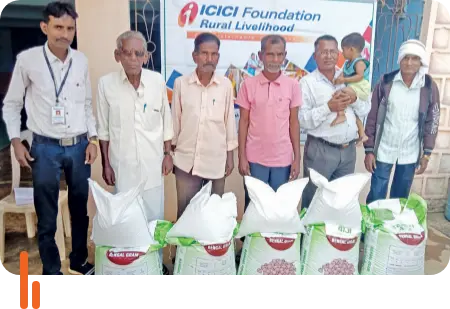
Distribution of crop seeds to farmers in Chandrapur district, Maharashtra
Nurturing Ecology in Core Zone
- Installed solar panels with total capacity of 33 kilovolt amperes (KVA) which meets 21% requirement of the forest’s electricity. This provides clean energy and enhances the safety of animals, due to removal of overhead electricity wires.
- Provided 11 patrolling vehicles to enhance vigilance in TATR.
- Initiated habitat restoration in 1,400 acres through removal of weeds and regeneration of palatable grasses and legumes.
- Provided avenues to support livelihood of villagers who are also members of the Eco-Development Committees, engaged in nurturing the habitation around the Protected Areas (PAs) in the forests.
- Planted 50,000 saplings of indigenous species over 206 acres.
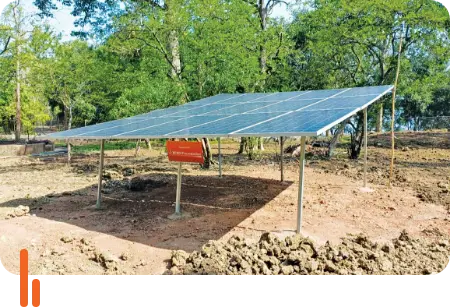
A solar panel installed at Tadoba-Andhari Reserve, Maharashtra
Enhancing Livelihood in Adjoining Villages
- Covered five development blocks of Sindewahi, Brahmapuri, Nagbhid, Chimur and Sawali in Chandrapur district with livelihood generation projects.
- Trained over 200 beneficiaries on cultivation of a variety of oilseeds on barren land in the Rabi season and also on the management of oilseed processing centres.
- Supported plantation of fruits and other vegetation across nearly 400 acres of land in 30 villages.
- Provided skill development to 470 rural youth in repairing ‘Electrical Home Appliances’ and ‘Solar & LED trades’.
Impact
- Income of 3,515 farmers in oilseed cultivation across 4,367 acres enhanced by ₹ 85 million in fiscal 2024.
- 4,100 farmers cultivated pulses over 4,000 acres of land in fiscal 2024 as a second crop in Rabi season.
Creating Water Bodies in Forests
ICICI Foundation is working on creating water structures in and around forests, national parks, and other protected areas to provide continuous access to clean water to wildlife and villagers. These include borewells, earthen bunds, watering holes, gabion structures, gravity structures, ponds, and water saucers. Further, these structures help in nurturing biodiversity, preventing soil erosion and recharging of groundwater. Continuous availability of water around the year for the animals helps reduce wildlife conflict and fosters the development of flora and fauna in the forest.
ICICI Foundation has so far created 95 water structures in the forests of Andhra Pradesh, Bihar, Karnataka, Madhya Pradesh, Maharashtra, Punjab, Rajasthan, Tamil Nadu and Telangana.
Some of the key initiatives, which were implemented in fiscal 2024, are mentioned below:
Building Water Saucers in Maharashtra
ICICI Foundation created 20 water saucers in Bor Tiger Reserve in Wardha district and 19 water saucers in Umred Karhandla Wildlife Sanctuary, spread across Bhandara and Nagpur districts of Maharashtra.
The construction of water saucers has made drinking water available in this water scarce region for the wildlife in the tiger reserve and the sanctuary. It also provided the animals with a facility for cooling themselves during summers.
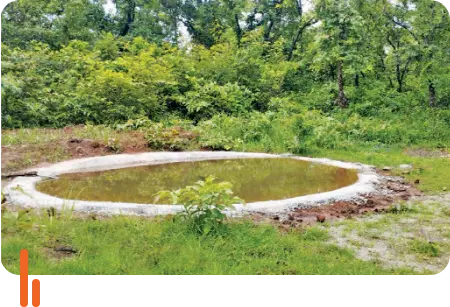
A water saucer created in Umred Karhandla Wildlife Sanctuary, Maharashtra
Constructing Waterholes in Tamil Nadu
ICICI Foundation created 16 waterholes across 20 forest villages to reduce human-wildlife conflict and enhance biodiversity in the Anchetty and Urigam ranges of Hosur Forest Division, Tamil Nadu. These ranges have a rich and diverse wildlife, but water scarcity during the dry seasons has been driving the animals to venture out in search of water. This was a cause of potential conflict between the local people and the animals.
With these interventions animals are more likely to stay within the forest boundaries, contributing to a healthier vegetation and a thriving forest cover. With construction on these waterholes in fiscal 2024, ICICI Foundation created an additional water capacity of seven million litres benefitting 300 animal species.
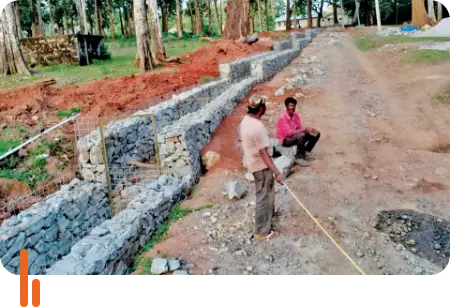
A gabion structure constructed at Nagarahole Tiger Reserve in Karnataka
Building Stormwater Drains in Karnataka
ICICI Foundation has been working on ecological conservation projects in Nagarahole Tiger Reserve in Karnataka since fiscal 2023. The reserve faced soil erosion due to high-velocity water flow during heavy rainfall, leading to soil deposits in the water bodies and drying up the pools. Rapid widening of the stormwater drain hampered wildlife movement, causing conflicts. The soil erosion also exposed the tree roots, causing the trees to fall and disrupting the forest ecology.
To address this problem, ICICI Foundation constructed a gabion — a stormwater drain made of big rocks held together by steel wire mesh and attached to the stream’s edge — in fiscal 2024 to channelise the water flow. This structure spans 250 metres across the forest. This has helped capture the silt at the source and protect the water bodies.
Case Study
Bhimashankar Wildlife Sanctuary
ICICI Foundation has undertaken a major conservation project at Bhimashankar Wildlife Sanctuary in Maharashtra, located in the Sahyadri ranges of the Western Ghats, one of the world’s top 10 biodiversity hotspots. The Government of India declared the sanctuary an eco-sensitive zone in 2020 as it harbours diverse flora and fauna, including a sub-species of the Indian giant squirrel. A part of Pune district in Maharashtra, the sanctuary provides livelihood support to hundreds of tribal communities living in and around it.
ICICI Foundation’s intervention in the area is three-pronged: conservation of the endangered biodiversity in the forest, protection of environment and generation of livelihood in the adjoining villages. These initiatives are estimated to impact about 3,680 beneficiaries.

A firefighting equipment provided by ICICI Foundation to Bhimashankar Wildlife Sanctuary
Conservation Interventions
- Provided 11 vehicles for patrolling as well as rescuing animals for eight range offices.
- Provided 38 rescue cages, and 32 firefighting equipment to the Forest Department.
- Developed overhead pathways on the main road to facilitate the cross over of territorial animals like the Indian giant squirrel and monkeys.
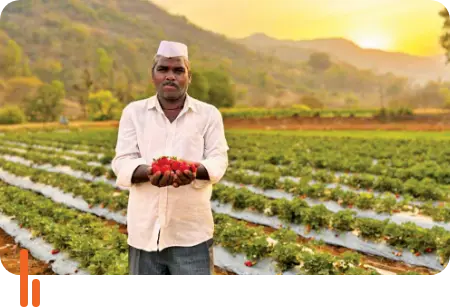
A farmer at a strawberry field in Bhimashankar Wildlife Sanctuary
Environmental Interventions
- Built 18 gabion structures stretching over 160 metres and 75 stone bunds in three basin areas of the sanctuary to prevent soil erosion and conserve water.
- Constructed rainwater harvesting systems in 10 schools in the Bhimashankar project area impacting approximately 500 students.
- Covered over 200 acres with watershed projects to facilitate irrigation and drinking water in villages.
- Installed solar panels in 35 schools to provide continuous supply of electricity.
Livelihood Generation Projects
- Introduced cultivation of strawberry in the region, which led to an increase in the average household income to ₹ 60,000 per season.
- Cultivation of pulses as an additional crop during Rabi season, resulting in an additional income of ₹ 10,000 per household per annum from every acre of land.
- Supporting nearly 500 households with backyard kitchen gardening.
- Planted over 10,000 mango saplings across 16 villages for future income enhancement of over 1,000 households.
Restoring Nallur’s Heritage Tamarind Grove
The Nallur Tamarind Grove, located at Nalluru Amanikere village in Bangalore Rural district, Karnataka, is India’s first biodiversity heritage site. The site, which is believed to have its origin in the Chola dynasty, is a habitat for 65 rare animal and bird species. The Karnataka Biodiversity Board has listed 310 tamarind trees inside the grove, with the oldest believed to be over 410 years old. The ruins of a temple within the grove enhances its importance.
The grove had been facing significant challenges in recent years due to neglect, leading to its degradation. These challenges included the destruction of the fence by local shepherds. Theft of tamarind, and invasion of the area by weeds and thorny wild plants were also a matter of concern.
ICICI Foundation has undertaken the following initiatives to restore the grove:
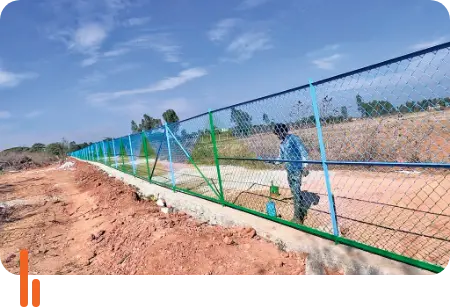
A fence installed to prevent unauthorised access in Devanahalli town, Bangalore Rural district, Karnataka
- Installed a fence to prevent unauthorised access, trampling of vegetation and littering.
- Completed soil work to provide nutrients and minerals for the growth of trees.
- Rejuvenated the pond inside the grove to promote water conservation, overall ecological health and aquatic biodiversity.
- Removed weeds, resulting in natural growth and regeneration of tamarind plants.
Water Conservation Efforts
Climatic changes have triggered an unprecedented need for focussed water conservation projects across the world, including India. ICICI Foundation has undertaken several projects to conserve and rejuvenate water bodies in various parts of the country. It works closely with local authorities and administration for undertaking projects in some of India’s water-scarce areas.
25.8 billion litres
Annual water harvesting capacity created
6,800
Schools benefitted from rainwater harvesting
1,180
Water bodies restored
(At March 31, 2024)
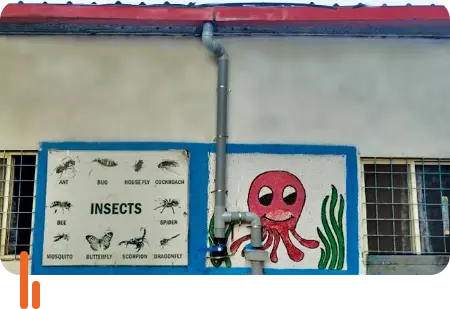
Rainwater harvesting pipes installed at an Army Public School in Pune, Maharashtra
Rainwater Harvesting in Schools
The efforts to develop rainwater harvesting structures continued during fiscal 2024. ICICI Foundation has been promoting Rainwater Harvesting (RWH) in areas facing serious water shortage, since fiscal 2021.
Till March 31, 2024, ICICI Foundation had installed 6,800 rainwater harvesting units in schools in 20 states, benefitting over 1.5 million students. These schools have an aggregate RWH capacity of over 16 billion litres a year. Of these, 1,079 were installed in fiscal 2024.
Scan the QR code to view the video on our RWH initiative at over 6,800 schools and institutions.
Reviving Ahar-Pyne Water Irrigation in Bihar
ICICI Foundation addressed water scarcity in Bihar’s Gaya district by restoring floodwater harvesting systems called ahars and pynes. These age-old systems, native to southern part of the state, collect water from rivulets or diversion channels for irrigation and domestic use.
Over time, silt accumulation reduced their capacity, exacerbating groundwater depletion. In 2024, ICICI Foundation revitalised three ahars in Belaganj and one in Barachatti, ensuring irrigation for farmers and boosting their income by enabling multiple crops annually.
This project has mitigated the district’s drought challenges sustainably. The project benefitted over 2,100 individuals. It has created a water holding capacity of 56.73 million litres and irrigated an area of nearly 5,250 acres.
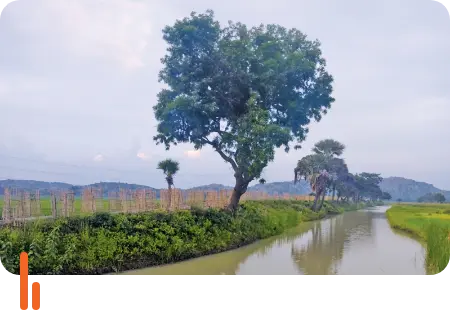
A water pyne in Gaya district, Bihar
Pond Rejuvenation in Reasi District, Jammu and Kashmir
ICICI Foundation has enabled natural renewal of groundwater in Reasi district, Jammu and Kashmir through development of watershed and rejuvenation of ponds. The project involved increasing the water-holding capacity of four major ponds and the introduction of advanced water purification techniques in the district.
The pond is refilled during the rainy season, becoming an important water resource for the local community, impacting over 268 beneficiaries. By restoring its ability to collect and hold rainwater, ICICI Foundation has ensured a reliable source of water for the region even in times of drought.
The project has helped to address the area’s water problem and improved its agricultural productivity. This has led to enhanced food security and livelihood of the farmers. The natural renewal of groundwater also contributed to long-term sustainability and drought resistance.
The initiative fostered community participation and ownership for the conservation of natural resources, enabling inclusive development of the region.
New Life to 30 Lakes in Kachchh
Over the past two years, ICICI Foundation has been undertaking watershed projects in 20 villages in Kachchh district, Gujarat. The project involves desilting and deepening of ponds, and creation of a river channel in the arid region.
ICICI Foundation collaborated with the local community to desilt 30 ponds, leading to creation of additional water storage capacity of 440 million litres. It also implemented a watershed project to recharge the groundwater.
These projects helped farmers to increase their income with growth in agricultural productivity and diversification of crops, and created opportunities for sustainable livelihood. The combined effect of these projects directly benefitted 1,950 families.
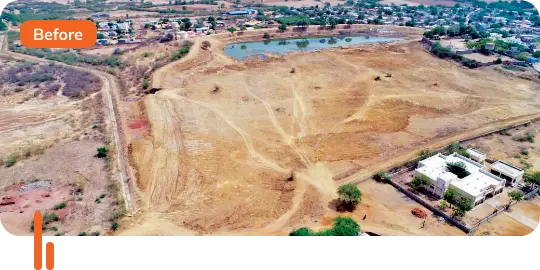
Desiltation of a pond at Lodai village in Kachchh, Gujarat
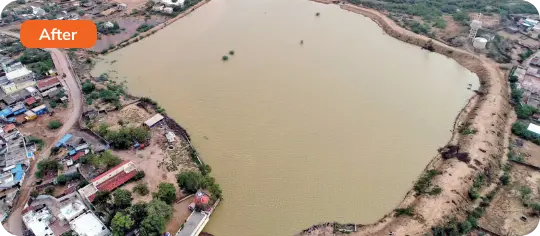
Ensuring Safe Drinking Water in Danapur Cantonment Area
ICICI Foundation installed a chlorine dosing pump at a water tank in Danapur Cantonment area in Patna, Bihar to help residents prevent waterborne diseases like cholera, typhoid, and diarrhoea. The tank has a capacity of 100 litres of chlorine dosing, which provides a consistent supply of safe water. The initiative benefitted the 250,000 residents living in the cantonment area by neutralising harmful bacteria, viruses, and parasites.
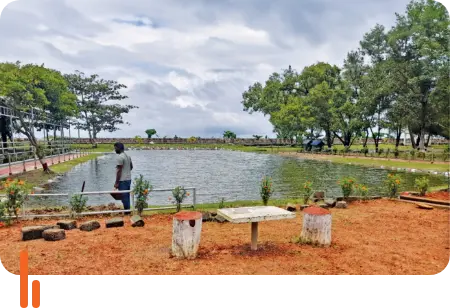
A pond created at INS Dronacharya in Fort Kochi, Kerala
Rainwater Harvesting at INS Dronacharya
INS Dronacharya, located in Fort Kochi, Kerala, is a premier sailor-training institute managed by the Southern Naval Command of the Indian Navy. The region faces dual challenges of severe water scarcity and saline groundwater. It occasionally is aggravated by monsoon flooding the area and leads to water logging in the campus, which requires the authorities to pump out excess water to sea.
To address these issues, from February to July 2023, ICICI Foundation carried out an extensive rainwater harvesting project covering 53 acres of the campus. The Foundation has created ponds and tanks in the premises to capture rainwater into an underground aquifer. By recharging the aquifer, the initiative aimed to dilute the salinity of the groundwater, making it suitable for use. Additionally, the project helped mitigate the flooding problems. The harvested water not only provided a sustainable resource of water but also facilitated recreational and sports activities at the campus.
Promoting Clean Energy
ICICI Foundation has embarked on several programmes to promote the use of clean energy. It installed solar units in schools and has been providing smokeless chulhas in the rural areas as part of this initiative. These initiatives are helping to reduce the carbon footprint and improve the quality of lives in villages. In fiscal 2024, ICICI Foundation also launched a project for the collection and transportation of garbage through electric vehicles (EVs) in a town in Maharashtra.
Installing Solar Units at Schools in Rural India
The project is part of ICICI Foundation’s ongoing solar power unit installation programme aimed at promoting environmental sustainability by reducing emissions and carbon footprint from conventional sources of power. ICICI Foundation has been installing solar units across India since fiscal 2022.
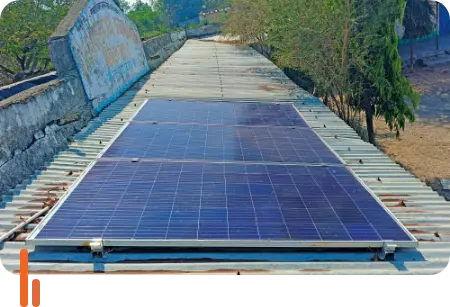
A rooftop solar panel at Mehekari village, Beed district, Maharashtra
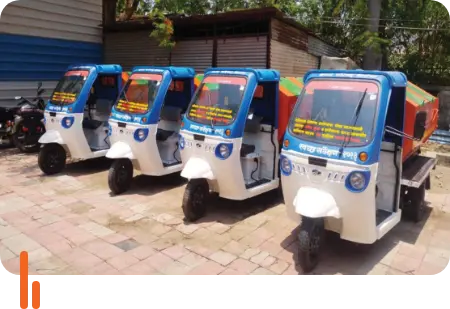
EVs for garbage collection in Latur district, Maharashtra
Providing EVs for Garbage Collection
ICICI Foundation supported the Nilanga Municipal Council in Latur district, Maharashtra, to collect and transport garbage with the help of electric vehicles (EVs) in June 2023. With some of its collection vehicles not working, the Municipal Council was finding it difficult to collect garbage of more than 12 metric tonnes every day.
ICICI Foundation’s initiative led to a two-pronged advantage. It has helped the Municipal Corporation in collecting garbage from all its 12 wards spread across 16.80 square kilometres regularly, eliminating air pollution which was damaging health due to the rotting garbage of nearly 42,000 residents. The vehicles have also helped in reducing the CO2 emissions caused by vehicles run on fossil fuel-based energy sources that were previously being used for garbage collection.
Previous Topic
